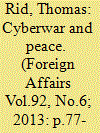| Srl | Item |
| 1 |
ID:
124652


|
|
|
|
|
| Publication |
2013.
|
| Summary/Abstract |
Cyberwar Is Coming!" declared the title of a seminal 1993 article by the RAND Corporation analysts John Arquilla and David Ronfeldt, who argued that the nascent Internet would fundamentally transform warfare. The idea seemed fanciful at the time, and it took more than a decade for members of the U.S. national security establishment to catch on. But once they did, a chorus of voices resounded in the mass media, proclaiming the dawn of the era of cyberwar and warning of its terrifying potential. In February 2011, then CIA Director Leon Panetta warned Congress that "the next Pearl Harbor could very well be a cyberattack." And in late 2012, Mike McConnell, who had served as director of national intelligence under President George W. Bush, warned darkly that the United States could not "wait for the cyber equivalent of the collapse of the World Trade Centers."
|
|
|
|
|
|
|
|
|
|
|
|
|
|
|
|
| 2 |
ID:
124579


|
|
|
|
|
| Publication |
2013.
|
| Summary/Abstract |
While there is a long, rich tradition of scholarship on the impact of foreign policy on presidential campaigns and elections, the question of the role of foreign policy concerns in congressional elections has been left largely unexplored. This is particularly surprising given that scholars have in recent years highlighted the significant impact of Congress on American foreign policy both as an institution and as the result of the foreign policy activism of individual members. This earlier research indicates that the role of foreign policy in congressional campaigns and elections deserves much more attention than it has so far received. In this project, we examine the use of foreign policy in the 2000, 2002, and 2004 congressional campaigns, analyzing the issue content of television advertisements produced by candidates seeking election to the US House of Representatives. We find that across the three election cycles, foreign policy issues became much more prominent over time but still remained a modest part of candidates' appeals to potential voters. We also find differences between candidates rooted in partisan identification and perceptions of policy performance on key foreign policy issues, and strong indications that candidates emphasize foreign policy issues that have significant local impact.
|
|
|
|
|
|
|
|
|
|
|
|
|
|
|
|